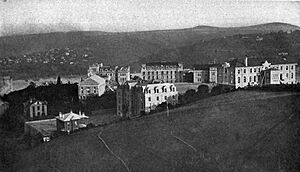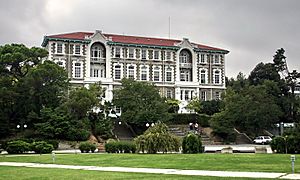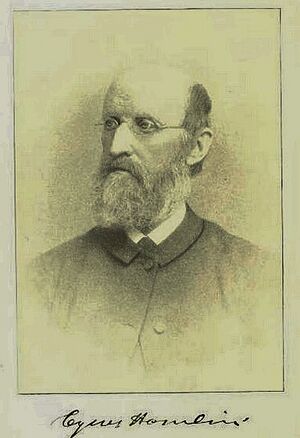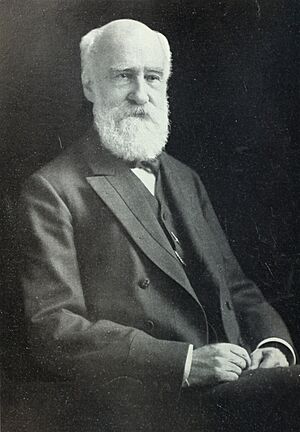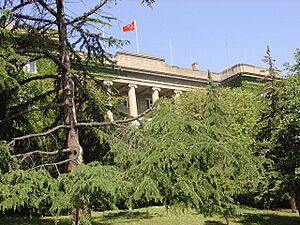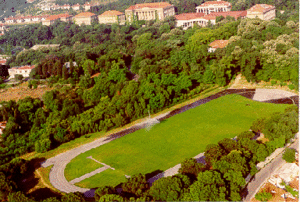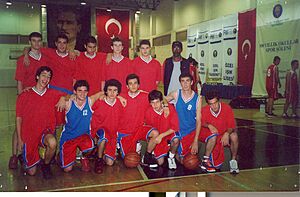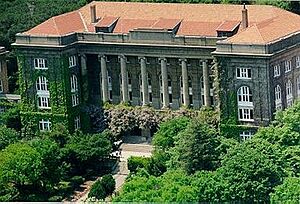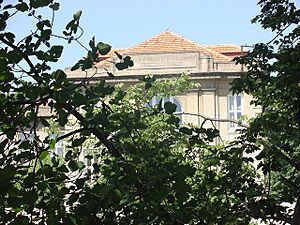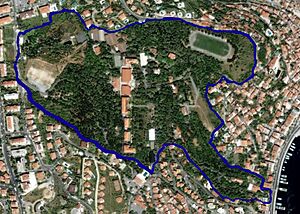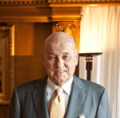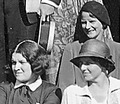Robert College facts for kids
Quick facts for kids Robert CollegeRobert Kolej
|
|
|---|---|
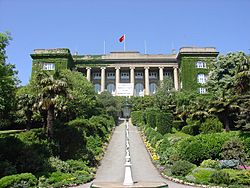 |
|
| Address | |
|
Kuruçeşme Cad. No. 87
Arnavutköy, Beşiktaş, Istanbul
Turkey
|
|
| Information | |
| Type | Independent, day and boarding |
| Established | 1863 |
| Founder | Christopher Robert and Cyrus Hamlin |
| CEEB code | 696220 |
| Headmaster | Whitman Shepard and Nilhan Çetinyamaç |
| Grades | Prep, 9–12 |
| Gender | Co-educational |
| Enrollment | 1,045 190 boarding 276 on scholarship |
| Language | English, Turkish |
| Campus size | 265 acres (107 ha) |
| Campus type | Urban |
| Houses | Gould Hall, Mitchell Hall, Woods Hall, Sage Hall, Bingham Hall, Feyyaz Berker Hall, Suna Kıraç Hall, Nejat Eczacıbaşı Hall |
| Student Union/Association | Robert College Student Council |
| Color(s) | |
| Mascot | Bobcat |
| Team name | Bobcats |
| Rival | Üsküdar American Academy |
| Accreditation | NYSAIS |
| Newspaper | Bosphorus Chronicle |
| Yearbook | Record |
The American Robert College of Istanbul (also known as Robert Kolej or RC) is a special high school in Turkey. It's a private school where both boys and girls learn together.
The school is located on a large, wooded campus in Istanbul, a big city in Turkey. It's near the historic Arnavutköy neighborhood. Robert College was started in 1863, making it the oldest American school outside the United States that has been open continuously.
Many famous people have graduated from Robert College. These include scientists, business leaders, politicians, writers, and artists. Some graduates even became prime ministers of Turkey and Bulgaria. A Nobel Prize winner, Orhan Pamuk, also went to Robert College. The school is part of the G30 Schools group, which includes top schools worldwide.
Contents
History of Robert College
Robert College was founded in 1863 by Christopher Robert, a rich American who loved helping schools, and Cyrus Hamlin, a missionary focused on education. Their first campus was built in Bebek, near the Rumeli Castle.
Cyrus Hamlin was the first president of Robert College. Later, George Washburn took over in 1877. During his time, he brought together many smart teachers who made the school's learning programs very strong.
When Christopher Robert passed away in 1878, he left a lot of his money to the college. The school's goal was to give students a great education, just like the best American colleges. They welcomed students from all backgrounds and religions.
Changes Over Time
Over the years, more Turkish students started coming to Robert College. This was because Turkey began to welcome foreign schools more, and many Turks wanted a Western-style education.
In 1971, a big change happened. The university part of Robert College became a public university called Boğaziçi University. The original Robert College campus in Bebek was given to the Republic of Turkey for this new university. Robert College then became only a high school, moving to the Arnavutköy campus. It still keeps the name "College" because of its long history.
Important Moments
- 1863: Robert College opened with 31 students.
- 1971: The university section of Robert College became Boğaziçi University. Robert College became a co-educational high school on the Arnavutköy campus.
- 1998: The school stopped accepting junior high school students because of new education laws in Turkey.
- 2004: The last junior high school students graduated, and that section of the school officially closed. Today, Robert College has Prep, 9th, 10th, 11th, and 12th grades.
Leaders of Robert College
| Heads of Robert College | |
|---|---|
| Head | Years of service |
| Cyrus Hamlin | 1863–1877 |
| George Washburn | 1877–1903 |
| Caleb Frank Gates | 1903–1932 |
| Paul Monroe | 1932–1935 |
| Walter Livingston Wright | 1935–1943 |
| Harold Lorain Scott (acting president) | 1943–1944 |
| Floyd Henson Black | 1944–1955 |
| Duncan Smith Ballantine | 1955–1961 |
| Harold Locke Hazen (acting president) | 1961 |
| Patrick Murphy Malin | 1962–1964 |
| James L. Brainerd (acting president) | 1965 |
| Dwight James Simpson | 1965–1967 |
| Howard P. Hall (acting president) | 1967–1968 |
| John Scott Everton | 1968–1971 |
| John Clay Chalfant | 1971–1977 |
| James Richard Maggart | 1977–1981 |
| Elizabeth Dabanovitch (acting head) | 1981–1982 |
| Alan Donn Kesselheim | 1982–1984 |
| Margaret A. Johnson | 1984–1988 |
| Harry A. Dawe | 1988–1992 |
| Benjamin D. Williams III (interim head) | 1992–1993 |
| Christopher Wadsworth | 1993–2001 |
| Livingston Merchant | 2001–2005 |
| John Russell Chandler | 2005–2012 |
| Anthony Jones | 2012–2015 |
| Charles H. Skipper | 2015–2019 |
| Adam Oliver | 2019–2025 |
| Whitman Shepard | 2025–present |
Learning at Robert College
Robert College is a five-year high school. The first year, called "Prep," helps students become fluent in English. Most classes are taught in English, including Science, Math, Literature, Art, and Music. However, History and Social Studies are taught in Turkish, as required by Turkish education rules.
Students
Each year, Robert College accepts about 180 to 220 new students. These students are among the top performers in a nationwide exam that all Turkish students take to get into high school. The school has around 1,000 students in total each year. Most students are Turkish.
Teachers and Staff
The teachers at Robert College have a lot of experience, averaging 20 years of teaching. Many teachers are from Turkey or the United States. About half of the teachers are Turkish, and nearly half are native English speakers. Many teachers also have advanced degrees.
What Students Learn Next
After graduating, many Robert College students go on to study at universities. About 50-60% of graduates choose to study abroad, often in the United States, Canada, or the United Kingdom. Those who want to study in Turkey get into universities based on their scores in a national exam. Robert College graduates often get into top universities in Turkey, like Boğaziçi University. Many also get into famous universities abroad, including Ivy League schools.
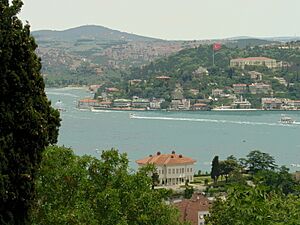
School Activities
Robert College has about 100 student clubs! The school was even the first place to introduce basketball to the Ottoman Empire in 1907. The first Student Council in the Ottoman Empire was also formed at Robert College in 1908.
Student Council
The Student Council is made up of students who are elected by their classmates. They help students, teachers, and the school leaders communicate. They also plan fun events and raise money for clubs. The Student Council organizes the Fine Arts Festival, which is the biggest and oldest high school festival in Turkey.
School Publications
Students at Robert College create several publications:
In English
- Bosphorus Chronicle: The school's newspaper, published four times a year.
- Record: The school yearbook.
- Kaleidoscope: A magazine for English literature.
In Turkish
- Köprü (The Bridge): The school's Turkish newspaper.
- Martı (Seagull): A Turkish literature journal.
- Oda (Room): A Turkish literature journal with student poems, stories, and photos.
- Tarih (History): The History Club's yearly publication.
- Sinek (Fly): The Film Review Club's yearly publication.
Events and Festivals
Fine Arts Festival (FAF)
The Fine Arts Festival is the biggest high school festival in Turkey. It happens every year in May and is organized by the Robert College Student Council. Over 2,000 people attend! There are many student performances, art shows, and dance shows. A famous artist or band usually performs at the end of the festival.
International Istanbul Youth Forum (IYF)
This is a yearly conference held at Robert College. Since 2006, students from many European countries come together to discuss important topics. It's organized by the Robert College European Youth Club.
Ethics Forum
The Robert College Ethical Values Club organizes a contest and conference about ethics for high school students from all over Turkey.
Robert College International Model United Nations (RCIMUN)
RCIMUN is a big conference where students act as delegates from different countries to discuss global issues, just like at the United Nations. It's organized by the Robert College Model United Nations Club and attracts students from many schools, including international ones.
Istanbul Gençlik Forumu (IGF)
This is a national conference where students from over 30 high schools in Turkey discuss the future of their country. They talk about international issues in Turkish and write resolutions.
Turkish Theater Festival (TIFES)
Organized by the Robert College Theater Club, TIFES is a major theater event for high schools in Turkey. Plays are performed, and famous actors and writers give talks.
Junior Achievement Robert College Conference (JARC)
This event brings together Junior Achievement students from across Turkey. They share experiences and learn from entrepreneurs and artists about topics like risk and careers.
Eurasian Schools Debating Championship (ESDC)
The ESDC is a well-known debating tournament for high school students from many countries. It's organized by students and is considered one of the best debating events worldwide.
Robert College Campus
The Robert College campus is 65 acres and overlooks the Bosphorus. It has beautiful old buildings designed in a classic style, as well as some newer ones. There are also many old trees and unique animals, like the Bosphorus Beetle, which is only found here.
Main Buildings
Gould Hall
This is the oldest teaching building on campus, built in 1914. It was a gift from Helen Gould Shepard. Inside, there's a beautiful Marble Hall. Gould Hall has administrative offices, classrooms, the library, and departments for Turkish Literature, Social Sciences, and English. It's a symbol of the school with its large columns.
Mitchell Hall
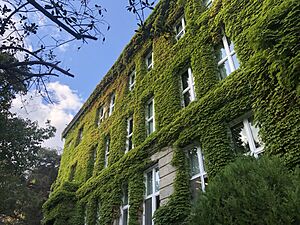
This building used to be the school's kitchen and dining room. Today, it has classrooms mainly for math, the Math Department, a computer center, and rooms for exams and club meetings.
Woods Hall
Completed in 1914, Woods Hall was once the Science Building. Now, it has classrooms mostly for English lessons and college counseling offices.
Sage Hall
Sage Hall was built as a dormitory and is still used for that purpose today. It houses the girls' dormitories, the school infirmary, and art studios.
Bingham Hall
This building was originally for a medical school. From 1925 to 1992, it housed the junior high school. Today, it's home to the boys' dormitories and administrative offices.
Feyyaz Berker Hall
Built in 1990, this building has science labs and classrooms. It's named after Feyyaz Berker, a famous Turkish businessman and Robert College graduate who donated a lot of money for its construction.
Suna Kıraç Hall
This is a modern theater building, also completed in 1990. It has a large stage and seating for 512 people. It's named after Suna Kıraç, a leading Turkish businesswoman and Robert College graduate. The music department is in its basement.
Nejat Eczacıbaşı Hall
The school's modern gym opened in 1990. It's named after Dr. Nejat Eczacıbaşı, a well-known Turkish scientist and businessman who graduated from Robert College. It also has offices for the P.E. department.
İbrahim Bodur Library
When Robert College started in 1863, its library had 200 books donated by Harvard University. Today, the library has about 40,000 books in Turkish and English. It also has many eBooks and online resources. The library was renovated in 2014 and is located on the second and third floors of Gould Hall.
Other Campus Areas
- The Rodney B. Wagner Memorial Maze
- Murat Karamancı Student Center (MKSC)
- Dave Phillips Field (sports field)
- Tennis and basketball courts
- Faculty housing
- The Bridge and Security (entrance area)
- Forum (a gathering area)
School Costs
Robert College's tuition fees for the 2020–2021 school year were:
| Day Student | Boarder (5 days) | Boarder (7 days) |
|---|---|---|
| TRY 109,000 | TRY 149,300 | TRY 167,770 |
| US$14,750 | US$20,235 | US$22,735 |
The school adjusts its tuition fees each year based on inflation, following rules from the Turkish Ministry of National Education. Robert College is known as one of the most expensive high schools in Turkey. However, about 26% of students received financial help in the 2019–2020 school year.
The school gets most of its money from tuition fees and donations. Many of the donations come from former students.
Famous Graduates
-
Bülent Ecevit, a former Prime Minister of Turkey
-
Orhan Pamuk, a Turkish writer and Nobel laureate

-
Ömer Koç, Chairman of Koç Holding
-
Calouste Gulbenkian, a businessman
-
Gülru Necipoğlu, a professor at Harvard University
-
Halet Çambel, a Turkish archaeologist and Olympic fencer
-
Halide Edip Adıvar, a Turkish novelist
-
İsmail Cem, a former Foreign Minister of Turkey
-
Tansu Çiller, the first female Turkish Prime Minister
-
Abidin Dino, a Turkish artist
-
Gilbert Hovey Grosvenor, the first editor of National Geographic
-
Arwa Damon, a CNN correspondent
-
Ömer Kavur, a Turkish film director
-
Dani Rodrik, a Turkish economist and professor at Harvard
-
Selim Sarper, a former Minister of Foreign Affairs
Since the time of the Ottoman Empire, Robert College graduates have been important leaders in many areas. These include arts, science, business, and government. Three Robert College graduates even represented their countries at the first meeting of the United Nations in 1945.
In 1990, three alumni, Nejat Eczacıbaşı, Suna Kıraç, and Feyyaz Berker, donated money to build new buildings on campus. The school also raises money through donations from alumni around the world.
Notable Former Teachers
-
Tevfik Fikret, an Ottoman-Turkish poet and educator
-
Karl von Terzaghi, an Austrian engineer
-
Frances Harshbarger, an American mathematician
-
Behçet Kemal Çağlar, a Turkish poet
-
Necip Fazıl Kısakürek, a Turkish poet
Many important people have also taught at Robert College, including:
- Tevfik Fikret, a famous Turkish poet.
- Cahit Arf, a Turkish mathematician.
- Calouste Gulbenkian, a businessman and art collector.
- John Freely, an American physicist and author.
- Cem Karaca, a Turkish musician.
- Karl von Terzaghi, known as the "father of soil mechanics."
See also
- Boğaziçi University
- Üsküdar American Academy
 | DeHart Hubbard |
 | Wilma Rudolph |
 | Jesse Owens |
 | Jackie Joyner-Kersee |
 | Major Taylor |


